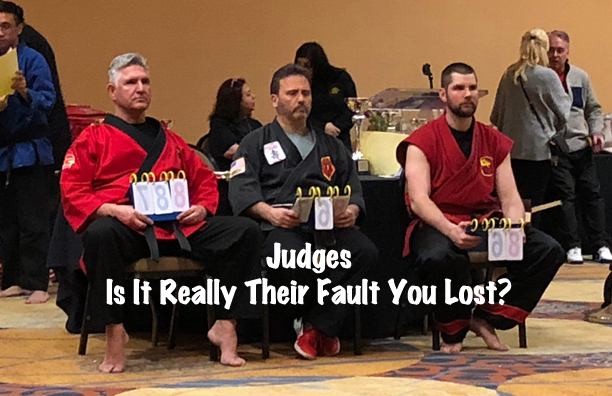Yesterday I had the unique privilege of judging at a local tournament. What made it unique for me was it was my first time judging other black belts. What made it a privilege was judging with two high-level martial artists that have both been in martial arts longer than I’ve been alive.

When the going gets tough, and the first ones to be blamed are the judges. And yes sometimes judges and referees make mistakes. Just look at the NFC championship game this year and I think most New Orleans Saints fans would agree. More often than not though, the best competitors win. With that said, I think it is important for us to look at and appreciate one of the toughest jobs in martial arts and that is judging a tournament.
Judging Forms:
How I prep my students for tournaments is to tell them that whether a judge knows their form or not, all judges are looking at certain criteria to base your score on: powerful strikes, strong/low stances, high and crisp kicks, and a good flow to the form without hesitation. Those are the things that I look for when I judge competition as well. Thankfully I did not have to judge any of my student yesterday. I personally feel it would be tougher for me to judge one of my students because I know what their potential is. I would want to judge them harder than I would any other competitors. I believe a lot of judges feel the same way however we all want to provide the fairest scores possible for all competitors. That is why tournaments have multiple judges not just one to keep scores where they should be and to hold other judges accountable.
Judging Weapon Forms:
The same rules apply for weapon forms that do in traditional form judging. However I add in level of difficulty in my judging as well. This does not mean the most difficult weapon to handle will win because competitors still needs to show excellence with that weapon. But it is something I take into account. As a spectator it’s fun to just watch at the swords, staffs and daggers flying through the air and judges love watching the forms as well. That’s what makes judging difficult: you have to sit back and judge multiple people doing exceptional things instead of just being able to enjoy it.
Judging Sparring:
In speaking with another school owner yesterday, he gave me some wonderful advice that he gives his students. “Your job in sparring is not just to score a point but to make sure that the judges can see you when you score a point. If the judges can’t see what you’re doing then your points don’t count and that’s on you as a competitor not the judges.” With five judges surrounding competitors as they spar, they don’t miss much. You only need three out of the five judges to see your move connect to score a point. If you can make the judges life easier then it can only help you succeed while sparring.
Judging Grappling:
This is not something that I have a ton of experience or exposure to. I just completed my first grappling competition yesterday but thought it was handled and run exceptionally well. Before the matches began, the ring leader sat everyone down and made sure everyone knew the rules. That’s crucial! Then he stuck to the rules as did his other judges on the mat. This was not UFC or any large combat organization looking to get a crowd of people excited. It was a local tournament to showcase skill. One of the last matches of the day a couple of 18-year-olds squared off. After holding his competitor down in a guard position for about a minute, one competitor locked in a kimura lock. After seeing the submission was fully locked in with no escape imminent, the judge waved off the match as to prevent any damage and awarded a “judges tap-out” victory to the student who locked in the submission. The judges agreed it was not worth injuring yourself and stopping your ability to train just for your pride of not tapping out.
I believe judges don’t judge because they want to make anyone have a bad time. Martial arts is a journey and all about learning and bettering yourself and judges are made up of school owners and other teachers that want to help you on your journey. If anyone blames a judge for losing, I encourage you to look at what you had done and ask yourself if it was truly your best work. Because if it was your best work, then that is enough to be proud of. And if your bests can get better, get back on the mat and train even harder.
Respectfully Submitted, Big Cat
